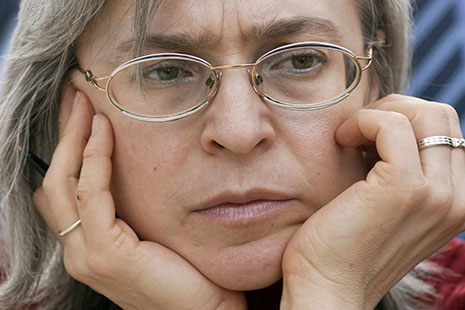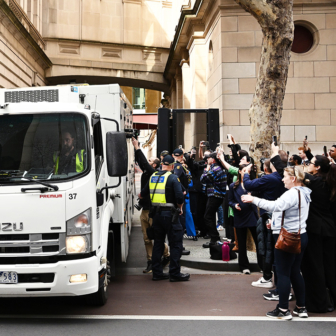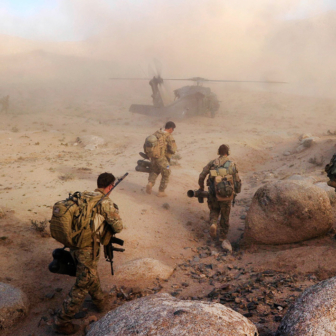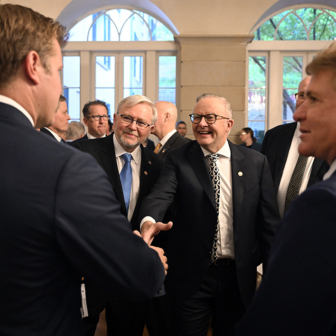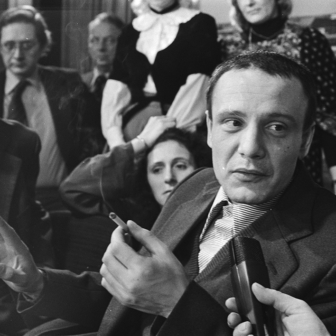IN A RECENT review of Anna Politkovskaya’s Nothing but the Truth: Selected Dispatches, Francesca Beddie offers her take on Politkovskaya’s brand of journalism: “She sees things in black and white. She does not shy away from judgments. She preaches rather than analyses.” All of it, of course, is in the past tense because Politkovskaya has been dead for almost four years, gunned down by an assassin – still at large – in her apartment building in the centre of Moscow.
Beddie, who was a diplomat in Moscow in the 1990s and, until recently, a member of the Australian Press Council, is clearly an ardent advocate of the cold-headed school of journalism. If only Politkovskaya could have suppressed “her anger and indignation,” she writes; if only she could have seen “the virtue in a more tempered use of language.”
Beddie’s review of the posthumous collection is a sterling example of cold-headed penmanship. It would have been easy, after all, to bake readers in the rhetorical fire, evoking a female reporter of legendary fearlessness, undeterred by repeated threats, beatings and a poisoning. But Beddie is not interested in turning Politkovskaya into a martyr or a pin-up (a refusal that would no doubt have pleased her). For Beddie, the murdered journalist’s life seems in many ways wasted. Not just because Politkovskaya was only forty-eight when she was killed, but also because – so Beddie believes – she had poured too much of her energy and talent into all manner of proselytising. This was at the expense of offering her readers an objective and cold-headed analysis of Putin’s Russia and of the situation in Chechnya – Politkovskaya’s principal subject matter in later years. (Not unjustly, some commentators call Chechnya Russia’s Vietnam.)
Beddie is intent on making a larger point here, of course – that a journalist no longer in possession of a cold head is likely to turn into a zealot, a crusader, someone who campaigns rather than reports. Hot-headed journalists, in other words, cannot help but put the cart (their emotions and convictions) before the horse (the story itself). No wonder journalism of this kind is doomed to self-destruct. Or so goes the rather well-rehearsed argument.
What is it with the fetishisation of cold heads in journalism? Granted, certain professions – the ones that land planes and perform keyhole surgeries – cannot adequately function without them, but don’t we have a cluster of rather distinguished hot heads to thank for some of today’s most powerful and enduring reporting? The late and much-loved Australian journalist Pamela Bone comes to mind, described in a eulogy by Michael Gawenda as “the most authentic journalist” he has ever known. And if you look up the most recent Pulitzer Prize winners in the investigative reporting category – the natural habitat for most of Politkovskaya’s dispatches – these guys and gals come across as very much the hot-headed types. I am not starting a list here, although if someone else does (“the best of hot-headed journalism”), I’d be eternally grateful.
American journalist Philip Gourevitch who, like Pamela Bone, was in Rwanda in the aftermath of the 1994 genocide, said subsequently – in a statement decidedly at odds with the usual journalistic objectivity and impartiality mantra – that an insistence on cold-headed journalistic neutrality in the face of a human catastrophe was “obscene.” In real emergencies, Gourevitch continued, this much-prized neutrality was frequently no longer morally neutral. For Politkovskaya, Chechnya was precisely this kind of an emergency, not only for the people of the region but for the whole of Russia. Any insistence on dispassionate reporting from the Chechen conflict – with the pain, anger and shame diligently filtered out – seemed to her the height of cynicism.
It is a fundamental misjudging of Politkovskaya to suggest that she had an agenda or an intractable, ideologically inflected reading of the situation in Chechnya. She wrote the way she did because she refused to believe that her role as a journalist was to speak to the entrenched cynicism of her readers and her society. She loathed the “abhorrently cold, calculated cynicism” of the Russian state elevated to the level of politics (and she also wrote scathingly about European cynicism that allowed Chechnya to be largely forgotten). And she loathed, too, the cynicism that pervaded her own profession, dominated by reporters anxious not to inconvenience the authorities and their readers.
Even on a good day Politkovskaya was too much – too relentless, too opinionated, too acerbic, too direct and too desperate to be heard. She was too much of a party pooper, too much of a nuisance. Invariably and on more than one occasion she was wrong, sometimes infuriatingly so. But we expect that from people who work the way she did, writing about the most desperate and degrading of situations that human beings can find themselves in.
For the record, Politkovskaya’s head was cool enough to handle the Russian secret service, FSB, when they poisoned her, and to handle Russian soldiers when they threatened to rape her before – as a pièce de résistance – staging a mock execution. Her head, whatever its temperature, allowed Politkovskaya to walk into a theatre filled with hostages and guarded by (rather short-tempered) men with machine guns and women in black with explosives strapped to their bodies.
The issue here, of course, is that Politkovskaya was after justice, justice not just for any specific group, ethnically or ideologically defined, but for everyone – for mothers of Russian solders killed in Chechen wars and for mothers of Chechens killed by those very Russian soldiers, for families of children murdered in the 2004 Beslan hostage tragedy by Chechen terrorists and for the next generation of Chechen boys and girls being groomed to become “freedom fighters” and martyrs.
Politkovskaya did not appoint herself the judge or the jury, but she was by no means a faithful follower of the separation of powers. A member of the fourth estate, she could not delude herself into believing that the first three were functioning in a remotely plausible way or even maintaining a pretence of independence and integrity. She was after justice, not just the facts. On the basis of Politkovskaya’s reports, at least thirty-nine legal processes have been instigated: a startling record considering how much of a pariah Politkovskaya was in her later years and how adept Russia’s judiciary has been at protecting those in power.
We can debate, of course, the Russian journalist’s trespassing ways as well as her conviction that for any decent journalist reporting facts alone is never even remotely enough. But it is important we understand that her conviction was not born out of the instincts of a propagandist or powered by any strand of personal fanaticism.
A unique database has been created recently to provide information about “all the violent, premature or unexplained” deaths of journalists in Russia from 1993 to the present day. The list had 324 names when I checked it. I entered the word homicide in the “motive” drop-down box and got a list of 168 journalists. Politkovskaya’s name was on the first page, her death unsolved, her murderer and the client who paid for the hit neither found nor brought to justice. This would have hardly surprised Anna; after all, this is precisely what she had been saying for all those years: there is no such thing as a little bit lawless.
Bruce Shapiro, the executive director of the Dart Center for Journalism and Trauma and a regular on Radio National’s Late Night Live, called the practice of journalism at its best “the fullest expression of citizenship.” This was Politkovskaya’s kind of journalism. Following her death, the Russian journalist Dmitry Dibrov wrote: “She embodied the spirit of journalism, which neophytes should study so as to preserve at least some respect for this profession.” He added: “Without Politkovskaya” Russia “will turn into the nation of commodity experts and aluminium exporters” at best.
In 2000 Anna Politkovskaya wrote an article for Novaya Gazeta about the ambush of a column of Russian soldiers on the border of Chechnya and Ingushetia. During her investigation, she came across all kinds of unclaimed objects scattered across the area – private things belonging to young boys from across Russia who would not be coming home. She gathered these belongings and brought them back with her to Moscow, so that families of Russian soldiers would have something of their sons in the eternity that was going to follow their death.
This is one story from her life. There are hundreds, probably many more than that. People came to her from across the country and Politkovskaya, knowing she was their last stop before complete despair, felt personally responsible to these people.
Did she get it fundamentally wrong? I am not so sure. If someone who is badly injured screams “Is there a doctor here?” a real doctor does not say, “Sorry, guys, I’m only an obstetrician.” Remember Dr Rob Carson – a GP in Maryborough who had to make a hole in the skull of a twelve-year-old boy to save him from dying. He did follow the phone instructions from a Melbourne neurosurgeon, but to operate he had to use a standard-issue household drill. “This little boy was dying in front of me,” Dr Carson said in an interview afterwards, “and that was actually more scary than anything I did.”
This doesn’t mean that we should advocate for a drill to become the medical tool of choice or that we should encourage doctors to get all gung-ho with household appliances. This story had such an impact because it was about what it meant to be a real doctor (and we have almost forgotten).
When we talk about the importance of cold heads in journalism it might look like we are taking journalism seriously, with cold heads standing in for impartiality, ethics and all the crucial checks and balances. Yet journalists are not diplomats and neither are they bureaucrats, they have (or should have) an altogether different function. Taking the job of a journalist seriously means that we recognise that sometimes journalists (just like Dr Carson) have to do everything – whisper, shout, analyse, throw hand grenades at their readers, whatever it takes to make something invisible visible, to push the weight of their stories through the walls of apathy and cynicism. Politkovskaya took her job seriously – in fact, as seriously as it could ever be taken. She left us with some of the true jewels of hot-headed journalism, works that for a moment seem to suspend all boundaries between people in her stories and us, her readers.
Of her brand of journalism I would say this. She saw people first in every situation. She was deterred neither by the colossal personal risks nor by the sheer scale of human tragedy she was compelled to cover. She told stories others did not dare touch.
All of this in the past tense, of course, because, tragically for all of us, Politkovskaya has been dead for almost four years, shot on her staircase by a man with a seriously cold head. •
